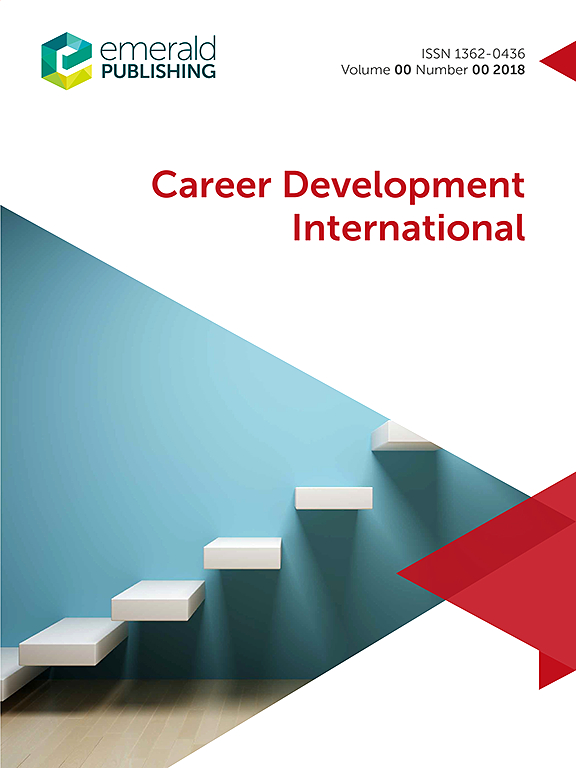How do careers of family members unfold?
Liselott Achtenhagen, Kajsa Haag, Kristina Hultén, Johan Lundgren
Audio > Play / Stop
CeFEO's Authors
CeFEO counts more than 50 scholars and 30 affiliated researchers. Several studies and reports have consistently identified CeFEO as a leading research environment worldwide in the area of ownership and family business studies.
This research project, has been co-authored by the following CeFEO Members.
Reference
Spotlight highlights research-based findings only. If you’re interested in exploring this project further or delving into the theoretical and methodological details, we encourage you to contact the authors or read the full article for a comprehensive understanding.

Achtenhagen, L., Haag, K., Hultén, K., & Lundgren, J. (2022). Torn between individual aspirations and the family legacy – individual career development in family firms. Career Development International, 27(2), 201–221.
https://doi.org/10.1108/CDI-06-2020-0156

What is Spotlight?
Spotlight is an innovative online family business magazine designed to bridge the gap between cutting-edge research and the real-world needs of practitioners, owners, and policymakers. Drawing on the latest findings from the Centre for Family Entrepreneurship and Ownership (CeFEO) at Jönköping International Business School, Spotlight delivers insightful, accessible summaries of key research topics. Our mission is to keep the family business community informed and empowered by offering actionable insights, expert analyses, and forward-thinking strategies that enhance business leadership and ownership practices for long-term success.

This article is brought to you by the WIFU Foundation
Spotlight is generously supported by the WIFU Foundation, which promotes research, education, and dialogue in the field of family business. This partnership enables us to continue bridging academic insights and real-world practice for the advancement of responsible family entrepreneurship and ownership.
What happens when personal dreams and family legacy ambitions collide?
Enterprising families thrive on shared values and joint aspirations—but what happens when those ideals don’t align with the individual goals of each member? This article dives into the dynamics of goal alignment and identity within family enterprises, based on a detailed longitudinal study of six Italian families. The findings reveal four distinct paths family members take depending on how their personal ambitions relate to the collective family goals. The research offers a refreshing, practical take on how family businesses can honor individual growth while safeguarding their legacy.
Enterprising families thrive on shared values and joint aspirations—but what happens when those ideals don’t align with the individual goals of each member? This article dives into the dynamics of goal alignment and identity within family enterprises, based on a detailed longitudinal study of six Italian families. The findings reveal four distinct paths family members take depending on how their personal ambitions relate to the collective family goals. The research offers a refreshing, practical take on how family businesses can honor individual growth while safeguarding their legacy.
Family businesses are built on a foundation of shared vision, loyalty, and legacy. Yet, under that seemingly unified structure lies a complex web of personal dreams, aspirations, and evolving identities. It’s common for family members to wrestle with the tension between fulfilling their own ambitions and contributing to the long-term vision of the family firm. For some, these goals may align naturally. For others, they may pull in entirely different directions.
These goal conflicts can either lead to innovation, if managed well, or fragmentation, if left unaddressed. How families respond to these tensions—whether they accommodate, reject, or negotiate them—can shape the trajectory of both the business and the individuals involved. The study summarized here provides much-needed insights into how enterprising families navigate this intricate landscape.
What We Studied
This study explores how family members in enterprising families handle the tension between individual goals and collective family goals. The research focuses on six Swedish enterprising families, drawing on extensive longitudinal qualitative data that includes life narratives, semi-structured interviews, and follow-up conversations.
What makes this study especially valuable is its use of retrospective storytelling and a life-course perspective. These methods allowed the researchers to trace how family members’ identities and goals evolved over time, and how they made key career and business decisions in response to internal family dynamics and external influences.
The authors ground their framework in identity theory, focusing on how individuals define themselves in relation to the “enterprising family”—a family whose members are engaged in business activities across generations. The article explores how individuals navigate identity conflicts and decide whether to join the family firm, create their own ventures, or step away altogether.
Key Insights
1. Four Configurations of Goal Alignment
The study identifies four core configurations that shape how family members relate to the enterprising family and its business over time:
- Aligned–Aligned: These individuals see no conflict between their personal goals and the family’s collective goals. They often join the family business and feel deeply integrated into the family identity.
- Aligned–Misaligned: Individuals want to support the family legacy but find the business context doesn’t offer opportunities that align with their personal aspirations. They may propose innovations or take on unconventional roles, often facing frustration if their ideas are not supported.
- Misaligned–Aligned: Individuals have personal goals that diverge from the family’s entrepreneurial path, but the family supports their choices. These individuals may pursue careers or ventures outside the family business while maintaining strong relational and emotional ties.
- Misaligned–Misaligned: When both the individual and the family see no alignment, this often leads to disengagement from the business and, in some cases, emotional distance.
2. Identity Shapes (and Reshapes) Business Involvement
The study shows that identity with the enterprising family plays a major role in decision-making. A strong sense of belonging can lead individuals to find creative ways to contribute, even when their professional goals don’t perfectly align with the family firm. Conversely, weak identity attachment often correlates with permanent exit or marginal involvement.
Importantly, identity is not fixed—it evolves with time, experiences, and relationships. For example, a child who initially rejects the idea of joining the family business may later return after gaining outside experience.
3. Divergence Can Be Constructive
Rather than viewing goal misalignment as a failure or threat, the study encourages family firms to see it as a source of potential growth. Diverging paths often lead to new business ventures, innovations, or expanded networks that can ultimately benefit the family as a whole.
4. Timing and Life Events Matter
Transitions such as education, marriage, having children, or business succession significantly influence both personal and collective goals. The authors show how key moments in life often prompt family members to reevaluate their positions, offering opportunities for renegotiating their roles within (or outside) the business.
Takeaways
Recognize and Embrace Goal Diversity
Instead of pushing for forced alignment, families should acknowledge and embrace the diversity of aspirations within the family. Goal variety doesn't signal weakness—it signals potential for multi-faceted growth.
Create Structures for Safe Exploration
Families can benefit from creating formal and informal opportunities for members to explore business roles or test entrepreneurial ideas without making long-term commitments. These include temporary projects, sabbaticals, and spin-offs.
Build Identity Through Shared Experiences
Strong identity with the enterprising family doesn’t have to be built solely through business involvement. Shared traditions, storytelling, and collaborative non-business activities also reinforce emotional bonds and long-term engagement.
Support Departures Without Breaking Bonds
Sometimes, family members need to leave to grow. When handled supportively, these exits do not threaten the family’s cohesion. They may even enrich the family’s legacy in the long term.
Impact
This study offers a fresh, identity-centered framework for understanding family member involvement in enterprising families. It moves beyond traditional succession models to highlight the complex emotional and aspirational terrain that families must navigate.
The implications are particularly relevant in today’s context of generational change, increasing individualism, and diversified career paths. For family businesses aiming to thrive across generations, success will depend not just on strategic alignment but on emotional intelligence, communication, and flexible support systems.
By showing that misalignment is not inherently destructive—and that identity can be both resilient and adaptable—the study provides a powerful lens for rethinking family business continuity and innovation.
Recommendations
- Conduct Regular Family Dialogue Sessions
Create structured conversations to explore evolving personal and family goals. Use facilitators or family business consultants if needed. - Support Multiple Forms of Engagement
Allow for flexible roles that reflect varied interests, such as philanthropy, family foundations, or advisory boards alongside core business roles. - Normalize Divergence Through Storytelling
Encourage sharing of “non-traditional” paths in family meetings to reduce stigma and celebrate diversity within the family. - Use Life Transitions as Checkpoints
Recognize key transitions—graduation, relocation, career shifts—as moments to check in on alignment and identity.

CeFEO's Authors
CeFEO counts more than 50 scholars and 30 affiliated researchers. Several studies and reports have consistently identified CeFEO as a leading research environment worldwide in the area of ownership and family business studies. This research project, has been co-authored by the following CeFEO Members.
Reference
Spotlight highlights research-based findings only. If you’re interested in exploring this project further or delving into the theoretical and methodological details, we encourage you to contact the authors or read the full article for a comprehensive understanding.

Achtenhagen, L., Haag, K., Hultén, K., & Lundgren, J. (2022). Torn between individual aspirations and the family legacy – individual career development in family firms. Career Development International, 27(2), 201–221.
https://doi.org/10.1108/CDI-06-2020-0156

What is Spotlight?
Spotlight is an innovative, AI-powered, online family business magazine designed to bridge the gap between cutting-edge research and the real-world needs of practitioners, owners, and policymakers. Drawing on the latest findings from the Centre for Family Entrepreneurship and Ownership (CeFEO) at Jönköping International Business School, Spotlight delivers insightful, accessible summaries of key research topics. Our mission is to keep the family business community informed and empowered by offering actionable insights, expert analyses, and forward-thinking strategies that enhance business leadership and ownership practices for long-term success.

This article is brought to you by the WIFU Foundation
Spotlight is generously supported by the WIFU Foundation, which promotes research, education, and dialogue in the field of family business. This partnership enables us to continue bridging academic insights and real-world practice for the advancement of responsible family entrepreneurship and ownership.

.png)









